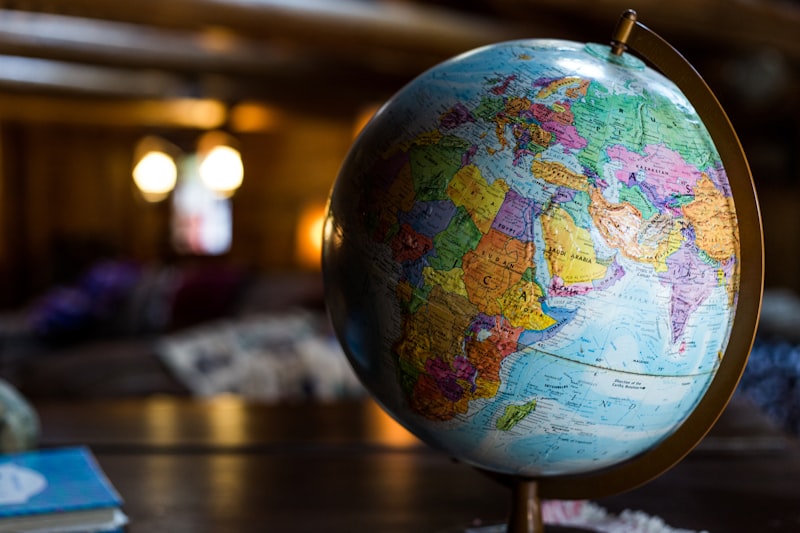When we think about the well-being of individuals, communities, and nations, the concept of global health comes to mind. But what does it really mean? Global health refers to the study, practice, and promotion of improving health and achieving equity for all people worldwide.
In this interconnected world, where borders are porous and diseases respect no boundaries, global health plays a vital role in safeguarding our collective welfare. It focuses on addressing health challenges that transcend borders, such as infectious diseases, non-communicable diseases, environmental factors, and social determinants of health.
One of the key aspects of global health is disease prevention and control. By investing in robust surveillance systems, early detection, and timely response, we can effectively combat outbreaks before they become global pandemics. Remember the recent Ebola and COVID-19 crises? They demonstrated the urgent need for international collaboration and preparedness to mitigate the impact of emerging threats.
But global health goes beyond crisis response. It also encompasses promoting healthier lifestyles and ensuring access to quality healthcare services for everyone, regardless of their socioeconomic status. This means tackling issues like poverty, malnutrition, lack of sanitation, and inadequate healthcare infrastructure, which disproportionately affect marginalized populations.
To achieve meaningful progress in global health, partnerships are crucial. Governments, non-governmental organizations, academic institutions, and the private sector must come together to pool resources, knowledge, and expertise. By leveraging each other's strengths and coordinating efforts, we can make significant strides towards achieving the United Nations Sustainable Development Goals related to health and well-being.
In summary, global health aims to create a world where every individual has the opportunity to lead a healthy and fulfilling life. It requires a comprehensive approach that addresses both immediate health concerns and underlying determinants. By nurturing a thriving global health ecosystem, we can build a future where everyone can enjoy the benefits of good health and contribute to a brighter, more prosperous world.
Breakthrough Discovery: New Vaccine Shows Promise in Eradicating Deadly Global Disease
Have you ever wondered if there will ever be a day when we can bid farewell to the looming threat of a deadly global disease? Well, brace yourself for some astounding news! A groundbreaking discovery has recently emerged on the horizon, offering a glimmer of hope in our battle against this relentless enemy. Scientists have unveiled a new vaccine that shows immense promise in eradicating the menace of this dreaded disease once and for all.
Imagine a world where communities no longer live in constant fear, where families are safe from the clutches of this devastating illness. It's an extraordinary thought, isn't it? This newly developed vaccine brings us one step closer to turning this dream into reality. Its effectiveness in combating the deadly global disease has left researchers astounded and filled with renewed optimism.
The beauty of this breakthrough lies in its potential to save countless lives across the globe. By harnessing advanced technologies and innovative approaches, scientists have managed to create a vaccine that targets the disease's root causes. This powerful weapon triggers a robust immune response, equipping our bodies with the necessary tools to fend off the relentless assault of the disease.
But what sets this vaccine apart from its predecessors? The answer lies in its remarkable efficacy and safety profile. Rigorous testing has shown that it not only provides exceptional protection against the disease but also minimizes the risk of any adverse side effects. This means that individuals from all walks of life, regardless of age or preexisting conditions, can benefit from its potential life-saving capabilities.
Think about it like a shield, guarding us against an invisible enemy. This groundbreaking vaccine is designed to fortify our defenses, empowering us to face the future with confidence. It represents a triumph of human ingenuity and perseverance, reminding us of our collective ability to overcome even the most formidable challenges.
As we stand on the precipice of this monumental breakthrough, hope is rekindled in the hearts of millions. The path to eradicating this deadly global disease is now within our reach. With this new vaccine leading the charge, we embark on a journey towards a brighter, healthier future for all of humanity.
Escalating Antibiotic Resistance Threatens Global Health: Experts Issue Urgent Warning
Introduction: Can you imagine a world where even the smallest infection could become life-threatening? A world where common illnesses, like strep throat or urinary tract infections, become untreatable? Unfortunately, that scenario may not be too far from reality. A growing concern among experts is the escalating threat of antibiotic resistance, which poses a significant risk to global health. In this article, we'll delve into the details surrounding this urgent issue and explore why immediate action is crucial.

The Rise of Antibiotic Resistance: Antibiotics have long been hailed as miracle drugs, effectively combating bacterial infections and saving countless lives. However, their overuse and misuse in recent decades have fueled the emergence of antibiotic-resistant bacteria. These superbugs have evolved to survive the effects of antibiotics, rendering these once-powerful medications ineffective.
Consequences for Global Health: The implications of antibiotic resistance are far-reaching and dire. Without effective antibiotics, routine medical procedures such as surgeries, organ transplants, and chemotherapy become perilous endeavors. Even minor infections can spiral out of control, leading to prolonged hospital stays, increased healthcare costs, and, worst of all, higher mortality rates.

Experts' Urgent Warning: Recognizing the gravity of the situation, experts from around the world are sounding the alarm. They warn that if we fail to address antibiotic resistance promptly, it could unravel decades of progress made in modern medicine. In a joint statement, these knowledgeable voices urge governments, healthcare professionals, and individuals to take immediate action to combat this looming crisis.
The Path Forward: To tackle antibiotic resistance effectively, a multifaceted approach is necessary. First and foremost, there must be a concerted effort to reduce the unnecessary use of antibiotics in human healthcare, animal agriculture, and the environment. This requires educating healthcare providers and the public about proper antibiotic usage and the potential consequences of misuse.
Furthermore, investing in research and development is crucial to discovering new antibiotics and alternative treatments. Encouraging the development of rapid diagnostic tests can aid healthcare providers in prescribing targeted treatments instead of broad-spectrum antibiotics.
Conclusion:
Pandemic Preparedness: International Efforts Strengthen to Combat Future Global Health Crises
Introduction: The world has witnessed the devastating impact of the COVID-19 pandemic, underscoring the dire need for robust global health crisis preparedness. Governments, organizations, and communities worldwide have recognized the importance of proactive measures to avert future pandemics. In this article, we explore the international efforts being undertaken to strengthen pandemic preparedness and create a resilient global healthcare system.
Enhancing Surveillance Systems: One key aspect of pandemic preparedness is bolstering surveillance systems. Countries are investing in advanced technologies and data analysis tools to monitor infectious diseases more effectively. By detecting outbreaks early, authorities can swiftly respond and prevent a localized issue from becoming a global catastrophe. These efforts involve close collaboration among international health organizations, national governments, and research institutions.
Coordinated Response Mechanisms: Effective response mechanisms are essential for tackling global health crises efficiently. International collaborative initiatives, such as the Global Health Security Agenda (GHSA) and the World Health Organization's International Health Regulations (IHR), facilitate cooperation and coordination among nations. These frameworks enable the sharing of information, expertise, and resources, ensuring a unified approach to address emerging threats.
Research and Development: Investments in research and development play a crucial role in pandemic preparedness. Scientists and medical experts are continuously working to understand emerging pathogens, develop effective vaccines, and improve diagnostic techniques. International collaborations in research expedite knowledge sharing, resource pooling, and accelerated vaccine development, enabling a swift response to future outbreaks.
Capacity Building and Training: Building capacity at both the national and international levels is vital to mitigate the impact of global health crises. Developing countries often face resource constraints, making it imperative to provide support in terms of infrastructure, healthcare personnel, and training programs. International organizations and wealthier nations are actively involved in capacity building initiatives to ensure no country is left behind.
Conclusion: The COVID-19 pandemic has served as a wake-up call for the world to strengthen its pandemic preparedness efforts. By enhancing surveillance systems, establishing coordinated response mechanisms, investing in research and development, and focusing on capacity building, international efforts are working towards combating future global health crises. Only through collaborative action, knowledge sharing, and proactive measures can we build a resilient healthcare system capable of safeguarding the health and well-being of people worldwide.
Revolutionary AI Technology Revolutionizes Remote Healthcare Access Worldwide
In today's fast-paced world, access to quality healthcare is a fundamental right. However, many individuals around the globe face barriers when it comes to receiving timely and efficient medical care. Thanks to revolutionary AI technology, remote healthcare access is being transformed, bringing transformative changes to people's lives.
Imagine a scenario where a patient living in a remote village, miles away from the nearest hospital, can receive accurate diagnoses and expert medical advice without leaving their home. This is now becoming a reality, all thanks to AI-powered healthcare solutions. By harnessing the power of artificial intelligence, healthcare providers are breaking down geographical boundaries and revolutionizing the way medical services are delivered.
Through the use of AI algorithms, cutting-edge software applications are able to analyze vast amounts of patient data, enabling healthcare professionals to make accurate diagnoses remotely. These intelligent systems can process symptoms, medical history, and even images or scans to identify patterns and potential health conditions. By utilizing AI technology, doctors can provide more rapid and precise assessments, ultimately leading to better patient outcomes.
Moreover, AI enables real-time monitoring of patients' vital signs, allowing healthcare providers to closely track their health status from a distance. Wearable devices equipped with sensors and connected to AI-powered platforms collect and transmit data, providing valuable insights into patients' well-being. In case of any anomalies or emergencies, healthcare professionals can intervene promptly, potentially preventing critical situations and ensuring prompt medical attention.
The impact of AI technology on remote healthcare access extends beyond diagnostics and monitoring. It also enhances communication and collaboration between healthcare professionals across different locations. Through secure teleconferencing platforms and virtual consultations, doctors can discuss cases, share expertise, and seek second opinions instantaneously. This not only saves time and resources but also ensures that patients receive the best possible care, irrespective of their location.
As we witness this technological revolution unfold, the possibilities for improving global healthcare access are immense. AI-driven solutions have the potential to bridge the gap between patients and healthcare providers, making quality medical services accessible to those who were previously underserved or faced geographical constraints.
Revolutionary AI technology is transforming remote healthcare access worldwide. By leveraging the power of artificial intelligence, healthcare professionals can overcome barriers of distance and deliver accurate diagnoses, real-time monitoring, and enhanced collaboration. As this remarkable journey continues, we can look forward to a future where everyone, regardless of their location, has equitable access to quality healthcare.